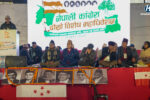KATHMANDU: Nepali Congress (NC) General Secretary Bishwa Prakash Sharma stressed the importance of a thorough reassessment within the party to contain the escalating ‘political conflagration’ originating from Koshi Province.
In a Twitter announcement on Sunday, General Secretary Sharma expressed concerns about party President Sher Bahadur Deuba not adhering to the party’s rules and cautioned against adopting a similar approach for those with differing viewpoints.
He also objected to the agreement reached with CPN-UML without prior consultation within the party.
Sharma urged for patience and maturity to prevent the situation from escalating further. He emphasized the need to address the complexity of the political landscape and the identity movement.
He mentioned that both General Secretaries had proposed finding a solution with the UML in Koshi, but the party ultimately approved the alliance with the CPN-Maoist Center and CPN-Unified Socialist Party during the last election, which was a collective party decision.
Sharma suggested that if the NC intends to leave the current ruling alliance and form another, an institutional decision should be made through discussion.
He said, “If we believe that leaving this alliance and forming a new one is the right course of action, we should engage in an institutional dialogue. Decisions should always be taken thoughtfully and not on a whim.”
Sharma acknowledged the Maoist Center’s legitimate concerns, emphasizing the need for the NC to address them, and urged for a mature approach in managing such disputes across all provinces.
He proposed that either the alliance should not be formed, or if it is, both the positive and negative aspects should be accepted. In a situation where no single party holds a majority, Sharma advocated for a culture of cooperation and stressed the need for organized restraint and integrated maturity through continuous dialogue from the party leadership.
Sharma concluded by highlighting the necessity for the NC to engage in serious introspection, advocating for an institutional process in candidate selection, and encouraging leaders with differing opinions to seek common ground within their groups.
He stressed the importance of adapting to changing times for the benefit of the party and emphasized the party’s readiness for change in the best interest of the organization.









Comment